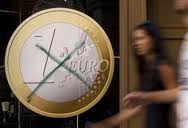Analytics
The best Experts' Views, Marks and Forecasts on Economics >>
Rules of Entry and Participation. Become a Member of Professional Society of Economic Journalists! >>

Euronews.net - A top British businessman is offering a 390,000 euro prize for any economist who can come up with the best plan for countries to stop using the euro.
Simon Wolfson, chief executive of British high street clothing chain Next, and a leading supporter of Britain’s ruling Conservative party, said he hopes the euro zone will stabilise but there has to be a plan in place in case it does not.
“The future of the world economy will, in large part, be governed by what happens over the next few years in Europe,” said Wolfson.
“I, along with most European businessmen, hope that the euro zone will stabilise, but in the event it does not Europe must not sleepwalk into a policy vacuum,” added Wolfson.
“This prize aims to incentivise the world’s brightest economic minds to help fill that policy void: their endeavours may well prevent Europe from descending into a financial chaos that would destroy savings, jobs, and social cohesion.”
Economists have until the end of January to submit proposals for the one-off prize, the biggest available to academic economists after the Nobel Prize.
Entrants will be judged by a panel of leading academic economists. The award process is being managed by Policy Exchange, an influential centre-right think tank.
Britain is a member of the European Union, although not part of the 17-nation euro zone. Its economic prospects are closely tied to the fate of the single currency.
This is the Commission’s third major investigation of the finance sector this year.
Banks are facing sweeping regulatory changes and tighter supervision of their business in the wake of the financial crisis. They were also a lightning rod for public protests in a “Day of Rage” over the weekend.
“If it is found true, it is a major concern and it is not going to help the cause of banks,” said a high-level EU banking regulator, who asked not to be identified, of the suspicions that prompted the EU raids.